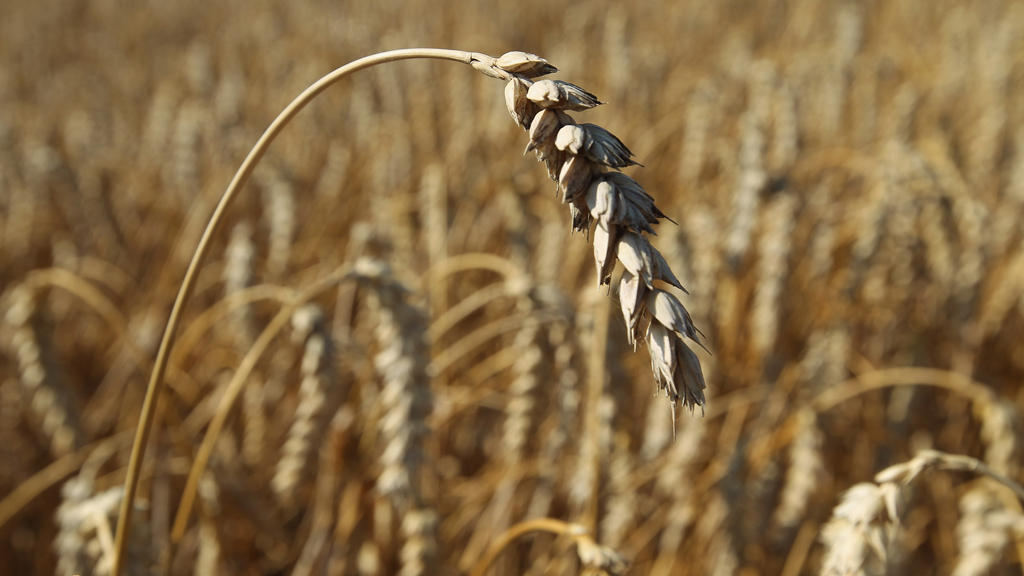Why are food prices set to rise: the key questions
With farmers warning that the price of wheat is rising, Channel 4 News answers your questions about how food prices will be affected and where.

Why are food prices set to rise in the short term?
The heavy rain over the summer in England and Wales resulted in a stark fall in farmers’ wheat crop this year – a 14.1 per cent fall on the five-year average – which means there will be more demand for what exists, driving up the price.
This has been exacerbated by problems with harvests in other countries as well: the worst drought in 50 years in the United States, and a heatwave in Russia will also impact on the global price of wheat and grain.
By how much?
The rising price of wheat does not directly correlate with the price of a loaf of bread. In fact, wheat or flour only accounts for around 10-30 per cent of what the consumer pays, with the baking and transporting part of the process making up the remainder of the cost.
Nonetheless, the price of bread has been on the rise in the last few years. Globally, wheat has already risen in price by almost 30 per cent in the last year alone, so even if producers look outside the UK for their produce, they will feel the pinch.
The British Retail Consortium says that a “fiercely competitive retail market” is protecting consumers from the most severe price rises, but there is a limit to how long the rising costs can be absorbed by farmers and smaller retailers. Oxfam believes that the price of food staples globally, including wheat and rice, may double in 20 years.

What foods have been affected by price rises?
The cost of wheat is hugely important to the overall agricultural ecosystem, as 50 per cent of all wheat that is produced goes towards feeding animals, and this has pushed up the price.
“Cereal prices impact directly on other sectors, especially pig and poultry farmers who are already struggling with higher feed costs,” said Guy Gagen, National Farmers’ Union chief combinable crops adviser. “These UK harvest results will do little to alleviate the global dynamics of commodity prices, with the prospect of relatively high commodity levels through to 2013.”
Other sectors have been feeling the pinch. The UK’s apple crop is down 27 per cent since 2011, according to English Apples and Pears, which has pushed up the price while vegetable crops have also been affected by the drought – quality, as well as quantity.
Haven’t they already risen in the last five years?
Wheat prices due to drought have made the headlines this week, but food prices have been rising significantly over the past five years. There were riots and demonstrations around the world in 2008 when food prices reached a sharp peak, but they have continued to rise, following severe weather in 2010.
Yemen, Somalia and Kenya are some countries that have already seen the drastic impact of rising food prices, says Tricia O’Rourke of Oxfam. “It is a result of the combined factors of rising food prices and humanitarian issues,” she told Channel 4 News. “In developing countries, where people are spending three quarters of their income on food, it is already having a huge impact.”
Who will notice a difference?
The population as a whole spends much less of the household budget on food than it did in the 1950s. But the lower a family’s income, the more of their budget they spend on food and the 10 per cent of lowest income earners have already been feeling the pinch as their wages have failed to rise with inflation.
Oxfam research from last year shows that food prices have been rising at over twice the rate of the incomes of the poorest. Food affordability for this group has dropped by 20 per cent over the past eight years, according to government figures.

What impact will this have on national health?
Food policy specialists have raised concerns about the impact that rising food prices will have on the health and wellbeing of those on low incomes. Between 2007 and 2010, low income families bought 25 per cent less fruit and 15 per cent fewer vegetables. They also cut back on bread, cereals, meat and biscuits.
“The squeeze on low incomes is immense,” Tim Lang, professor of food policy at City University told Channel 4 News. “It [government figures] suggests widening health inequalities still further, as food is always a flexible item in household budgets.”
What is the solution?
With international trade of food across the world, there is no doubt that the cost of food is a global issue. Professor Sir Gordon Conway, author of One billion hungry: how can we feed the world? says that a combination of increased food production, environmental stability and poverty reduction is part of the solution.
However closer to home, the government has been criticised for failing to address issues of rising food prices, with some calling for a specialist food policy group to be established.
“The government needs to lift its head out of the sand,” Mr Lang told Channel 4 News. “In opposition, Lib Dems and Tories agreed to continue the shift which began to happen – slowly, reluctantly – under Labour after the 2007-08 price hike. Then as coalition, they axed all policy development.”